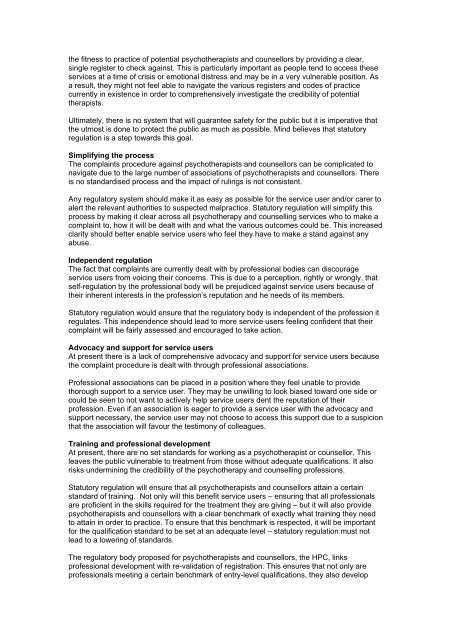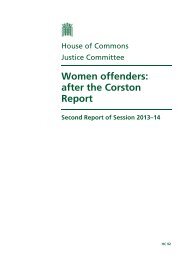Regulation of psychotherapists and counsellors - Mind
Regulation of psychotherapists and counsellors - Mind
Regulation of psychotherapists and counsellors - Mind
You also want an ePaper? Increase the reach of your titles
YUMPU automatically turns print PDFs into web optimized ePapers that Google loves.
the fitness to practice <strong>of</strong> potential <strong>psychotherapists</strong> <strong>and</strong> <strong>counsellors</strong> by providing a clear,<br />
single register to check against. This is particularly important as people tend to access these<br />
services at a time <strong>of</strong> crisis or emotional distress <strong>and</strong> may be in a very vulnerable position. As<br />
a result, they might not feel able to navigate the various registers <strong>and</strong> codes <strong>of</strong> practice<br />
currently in existence in order to comprehensively investigate the credibility <strong>of</strong> potential<br />
therapists.<br />
Ultimately, there is no system that will guarantee safety for the public but it is imperative that<br />
the utmost is done to protect the public as much as possible. <strong>Mind</strong> believes that statutory<br />
regulation is a step towards this goal.<br />
Simplifying the process<br />
The complaints procedure against <strong>psychotherapists</strong> <strong>and</strong> <strong>counsellors</strong> can be complicated to<br />
navigate due to the large number <strong>of</strong> associations <strong>of</strong> <strong>psychotherapists</strong> <strong>and</strong> <strong>counsellors</strong>. There<br />
is no st<strong>and</strong>ardised process <strong>and</strong> the impact <strong>of</strong> rulings is not consistent.<br />
Any regulatory system should make it as easy as possible for the service user <strong>and</strong>/or carer to<br />
alert the relevant authorities to suspected malpractice. Statutory regulation will simplify this<br />
process by making it clear across all psychotherapy <strong>and</strong> counselling services who to make a<br />
complaint to, how it will be dealt with <strong>and</strong> what the various outcomes could be. This increased<br />
clarity should better enable service users who feel they have to make a st<strong>and</strong> against any<br />
abuse.<br />
Independent regulation<br />
The fact that complaints are currently dealt with by pr<strong>of</strong>essional bodies can discourage<br />
service users from voicing their concerns. This is due to a perception, rightly or wrongly, that<br />
self-regulation by the pr<strong>of</strong>essional body will be prejudiced against service users because <strong>of</strong><br />
their inherent interests in the pr<strong>of</strong>ession’s reputation <strong>and</strong> he needs <strong>of</strong> its members.<br />
Statutory regulation would ensure that the regulatory body is independent <strong>of</strong> the pr<strong>of</strong>ession it<br />
regulates. This independence should lead to more service users feeling confident that their<br />
complaint will be fairly assessed <strong>and</strong> encouraged to take action.<br />
Advocacy <strong>and</strong> support for service users<br />
At present there is a lack <strong>of</strong> comprehensive advocacy <strong>and</strong> support for service users because<br />
the complaint procedure is dealt with through pr<strong>of</strong>essional associations.<br />
Pr<strong>of</strong>essional associations can be placed in a position where they feel unable to provide<br />
thorough support to a service user. They may be unwilling to look biased toward one side or<br />
could be seen to not want to actively help service users dent the reputation <strong>of</strong> their<br />
pr<strong>of</strong>ession. Even if an association is eager to provide a service user with the advocacy <strong>and</strong><br />
support necessary, the service user may not choose to access this support due to a suspicion<br />
that the association will favour the testimony <strong>of</strong> colleagues.<br />
Training <strong>and</strong> pr<strong>of</strong>essional development<br />
At present, there are no set st<strong>and</strong>ards for working as a psychotherapist or counsellor. This<br />
leaves the public vulnerable to treatment from those without adequate qualifications. It also<br />
risks undermining the credibility <strong>of</strong> the psychotherapy <strong>and</strong> counselling pr<strong>of</strong>essions.<br />
Statutory regulation will ensure that all <strong>psychotherapists</strong> <strong>and</strong> <strong>counsellors</strong> attain a certain<br />
st<strong>and</strong>ard <strong>of</strong> training. Not only will this benefit service users – ensuring that all pr<strong>of</strong>essionals<br />
are pr<strong>of</strong>icient in the skills required for the treatment they are giving – but it will also provide<br />
<strong>psychotherapists</strong> <strong>and</strong> <strong>counsellors</strong> with a clear benchmark <strong>of</strong> exactly what training they need<br />
to attain in order to practice. To ensure that this benchmark is respected, it will be important<br />
for the qualification st<strong>and</strong>ard to be set at an adequate level – statutory regulation must not<br />
lead to a lowering <strong>of</strong> st<strong>and</strong>ards.<br />
The regulatory body proposed for <strong>psychotherapists</strong> <strong>and</strong> <strong>counsellors</strong>, the HPC, links<br />
pr<strong>of</strong>essional development with re-validation <strong>of</strong> registration. This ensures that not only are<br />
pr<strong>of</strong>essionals meeting a certain benchmark <strong>of</strong> entry-level qualifications, they also develop

















